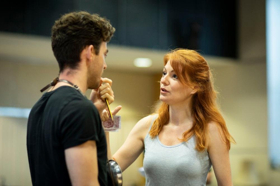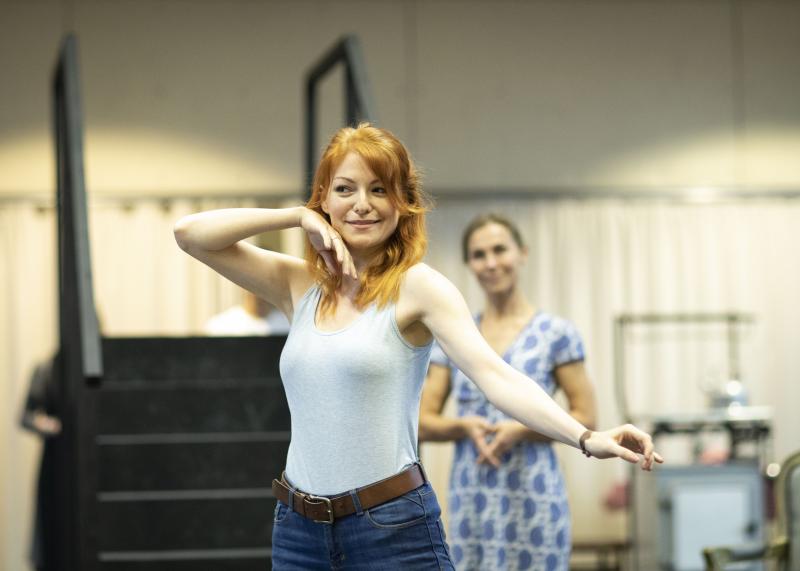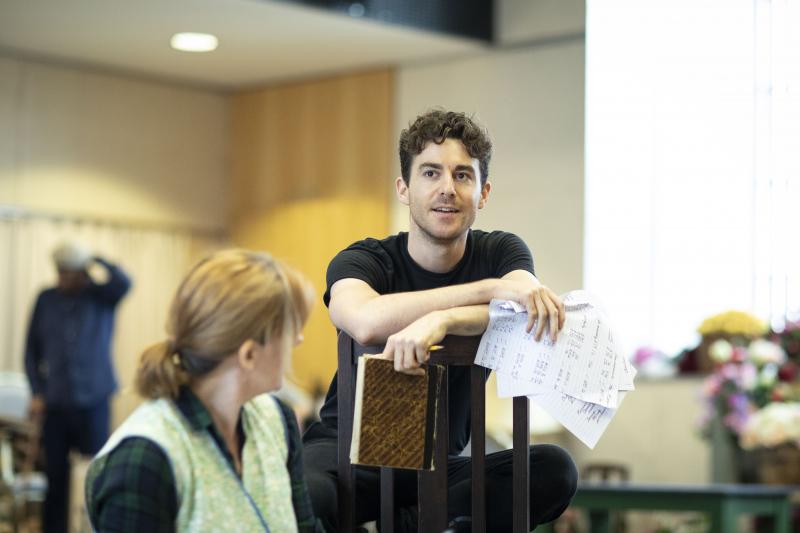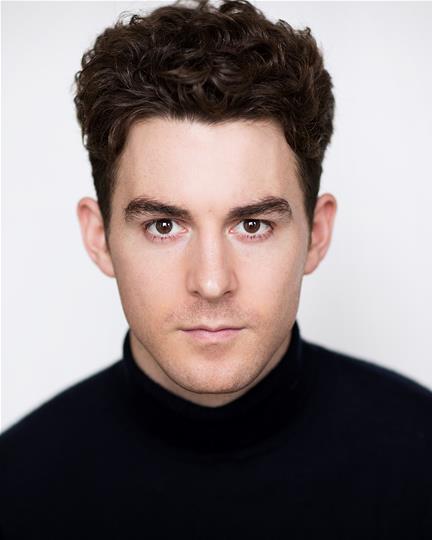Interview: Laura Pitt-Pulford and Louis Maskell Talk FLOWERS FOR MRS HARRIS, Chichester Festival Theatre

rehearsal for Flowers for Mrs Harris
Laura Pitt-Pulford and Louis Maskell are returning to their roles in Flowers for Mrs Harris at Chichester Festival Theatre after previously being in the 2016 Sheffield Crucible run.
Laura Pitt-Pulford garnered an Olivier nomination for playing Milly in Seven Brides for Seven Brothers and has also been seen in Side Show and Nell Gwynn. Louis Maskell is best known for playing the lead role of Grinpayne in The Grinning Man, which was on earlier this year at the Trafalgar Studios.
How did you become involved with theatre?
Laura: With me, it started from a musical aspect. I was brought up with music - I was a musician. I was also brought up on old musical films and loved that genre. It sort of happened from there. My first ever production was Wind in the Willows. Someone came and said, "You know, you should join this amateur dramatics company" and I thought, "Well that's ridiculous".
But then I got in and I remember my first time going on a proper stage that wasn't at my school and thinking, "Oh my god, this feels really normal. It just feels like I'm in my bedroom". It was like a bug that you get. I think you either get it or you don't and I did and it's sort of never left since then.
Louis: Basically, my parents were musicians. My dad used to play in the Philharmonia but also dep in some musicals. I was sort of conditioned from a very young age to see as much theatre as my parents would take me to. In that respect, I had no choice, I think. I saw so much and it led me onto starting dance lessons from...
Laura: Sorry, I'm just imagining you doing ballet.
Louis: Yeah, it's great, I know.
Laura: We should get some in the show!
Louis: From about age nine, I think. Then, that progressed. I went to Brit School and did a really fantastic musical theatre course there, which stood me in really good stead for drama school. I didn't really have any other distractions. I was pretty tunnel-visioned and luckily, it worked out.
Laura: Luckily you were good.
Louis: Thank you, Laura.
Laura: No, you are good - but that's the only compliment you're going to get! If and when I have children and they say, "I want to be an actor", and then I watch them in something and they're just dreadful or they say "I want to be a singer" and they're just completely tone deaf, I really hope I have it in me to be able to somehow tell them.
Louis: You would. In this industry, honesty is policy. Even when you're on the right track...the knockbacks that I've gotten made me stronger.
Laura: t's true, just pray that people are honest. And if they think you've got it, then great!
Can you tell us a bit about Flowers for Mrs Harris?
Louis: Flowers for Mrs Harris is a story about a remarkable lady who through her kindness and warmness of her heart, her generosity, and her innocence actually changes people and how they perceive themselves and, I guess, how she perceives herself too. It does feel like a fairy tale.
Laura: But the most real fairy tale you could ever imagine. The humanity within the piece is extraordinary. What's really fascinating is, obviously Louis and I did it before in Sheffield, and whether you're in it or an audience member it leaves you with this feeling that anything is possible. And how cheap it can be to offer kindness, and how we have the ability and the power just as human beings to make a humongous change.
What's extraordinary about every single character in this show is that they have that change. They all have a journey arc. They all gain something from Mrs Harris's warmth and kindness. Often, I think, we forget as human beings that we have that within us, to bring happiness to other people and to change things and make a difference.
The one other time I really feel that is when I watch the film It's a Wonderful Life. I once went to the cinema to watch it around Christmas in Belfast. It finished and everyone got up and no one knew each other but everyone just hugged. It was the weirdest experience. You just realise how much power we have as human beings to love each other. It was really bizarre, but really moving.
There are many pieces that have moved me, but never really made me feel quite that way. This piece does that and I felt that from the first moment I read it before I even heard the music. That just took it to a whole new level, which we can't even go into because I'll end up crying.

Flowers for Mrs Harris
Have either of you read the book it's based on or seen the Angela Lansbury film?
Laura: Yeah, I read the book.
Louis: I've read the book. It's really quite an easy read. Obviously, we are doing the story ,but in terms of the saccharine-ness and the sweetness and the quaintness of the book, we have shifted that and made it a lot more relatable as opposed to sort of...
Laura: Twee.
Louis: Yeah, twee, which it has the potential to be. But twee, our production is not. I haven't seen the movie, but I'd be interested to see it because I'm a bit of a fan of AL. Bedknobs and Broomsticks is an absolute banger of a movie. I'd love to see the film of it.
Laura: It's really interesting, you said it's like a fairy tale. And you know how a fairy tale is so simple? The book has the simplicity of a fairy tale. What is great about this show is that every character is so much more well-rounded.
Whereas in the book, you touch upon the characters but you don't learn as much about them. Obviously, you do about Mrs Harris because she's our protagonist, but what's so clever and quite an accomplishment for the writers is that they have managed to make stories for everyone.
Which is great for us who play the parts because often, especially in a musical, what really irks me is that you get, "Oh I'm playing the friend of the lead" or "I'm the wife of" and you don't get your own story and that can be really frustrating. Of course, you try really hard to create one, but these characters all have their own little side stories going on, and as an audience member, you witness the story - it's not just an internal one.
That leads perfectly into my next questions. Can you tell us a bit about the characters that you play? You each play two characters, right?
Louis: Basically, all of the actors and actresses in this show (apart from Clare Burt who plays Mrs Harris) play multiple characters. My London character is called Bob Smith and he is a pretty frustrated accountant - which is mirrored with my French character, who is equally frustrated and is also an accountant, at the House of Dior. His name is André Fauvel. Both of these characters respectively have huge crushes on Pamela, who is in London, and Natasha in France, who Laura plays.
They are really quite tricky to play, because you have a short amount of time to really land the characters. That coupled with the really complex music and a revolve is challenging, but it's a really good challenge. On top of that, when you go to France, we're speaking and singing in French accents. You have to sort of differentiate between the two roles whether that be physically or vocally, so in that sense, I like playing these two parts because it's hard to do.
Laura: I'd agree with Louis. It's the challenge of it that's one of the most appealing things. Both of the roles, Louis's and mine, are quite substantial roles and very demanding vocally. I play Pamela in the first half and she is a wannabe actress, but more just wants to be loved and adored.
Louis: She sort of seeks fame.
Laura: Yeah, she seeks fame as opposed to art. She's troubled; she has many issues. What's amazing is that, I think people will see a lot of themselves in her, I hate to say it. She's quite expressive about her emotions and often we're really good at holding them in. I think a lot of people have all the emotions Pamela has, but they have more skills to hold it in, whereas Pamela has no skills. She just goes, "Bleh!" That makes her really fun to play.
I also play Natasha, who is the Christian Dior top model in Paris. She is vocally the opposite to Pamela and her demeanour is very different. Whereas I said Pamela has this sort of word-vomiting ability, Natasha has the skills to be able to keep it together. It's sort of like Pamela has what Natasha wants and Natasha has what Pamela wants. It's quite interesting to play and to sort of find those mirrors in the characters.

Flowers for Mrs Harris
How would you describe the show musically? Is there anything you can compare it to stylistically?
Louis: Richard [Taylor]'s writing is quite unique. There's a German word for speak-singing, Sprechstimme, which is sort of this show. There are heavy influences of Sondheim, but also actually this might be a bad thing to say, but I feel like there are real Disney elements to it.
Laura: There are parts where you get into a melody...
Louis: ...and it's so catchy, it could be in Bedknobs and Broomsticks. It could be in those kind of movies. I think that combination leads to such a physical and emotional response. Not only onstage when I'm doing it, but when I'm offstage and watching. The music is so unbelievably stimulating.
There really isn't much around in terms of British musical theatre that does it. It's very, very different to say, The Grinning Man, which is in a completely different sort of stratosphere. It feels very classical sometimes, but also very accessible.
Laura: I know nothing like it. Richard sort of has his own niche, but he has this extraordinary ability to do something to you in every way. The reactions I find myself having to this music, emotionally and physically...it can break me down. It's very hard to learn; it's probably the toughest challenge I've had as far as notes wise and learning it. But once you know it inside out, you just relish in it.
Louis: Basically he writes the way people speak, the way Laura's speaking now. When you learn music, you never really come across that, because how I'm speaking now is impossible to predict. But when you conquer it, it feels just like you're talking. In that respect, it's massively successful.
Also just to add onto that, Richard doesn't write this music at the piano. He just writes it in his head and then puts it on the computer. For me, when you read the music, that's ridiculous. It's not simple.
You both were in the production in Sheffield in 2016. What's it like to return to the roles?
Laura: It's really lovely actually. We've had about two years away from it. It's really interesting how we change as people in those two years. That can be through personal things that have happened to us, jobs that have happened in between. I don't think Louis's done anything in between.
Louis: Just bumming around.
Laura: Quite a small show called The Grinning Man. You probably won't know that. You change as a person, so you offer up new things. It's crazy how you forget as well. You think, "I'm going to come in here and it'll be easy because I know it". But you don't! And there have been changes, but even the things that we knew, we had to start as if we didn't know them because they slip from your mind, especially with music like this where it's so difficult, it's easy to lose what you had at the time.
But I find that quite refreshing actually because it hasn't felt stale. It hasn't felt like we're revisiting, but like we're recreating this piece again. We've got new cast members, which is lovely. There's a really nice balance of old and new. You're playing with something different, you're being offered something different by them and therefore you have a chance to find something different in your character.
Louis: I think also because in Sheffield, it was such a short run. To be able to come back to something, having done all of that work, and then just sort of layering on top is really nice because I think, collectively, we all felt like we hadn't yet gotten to grips with it. Also, having done all that work and it being in my subconscious, coming back to it and bringing all that subconscious back to my head, it's a lot easier to do French now.
Laura: That's so true.
Louis: I feel much more confident in the French.
Laura: More calm.
Louis: Like I can do this and what I'm doing now is just building. I feel sorry for the new cast.
.jpeg)
For anyone who saw the show in Sheffield, what kind of changes can they expect?
Laura: More clarity. It's tighter.
Louis: It's funnier.
Laura: There's even more depth to the characters than there was - maybe not Mrs Harris, but the slightly smaller characters. You get on the journey much quicker. I think it's wittier and even more moving, dare I say.
Are there themes or ideas that you think might resonate with audiences?
Louis: Mrs Harris is such a relatable person, and the way she's been written and the way Clare is playing her means that there is something for everyone. It's impossible I think not to be moved, whether it's sadness or elation. I think in that respect, audiences will gain a huge amount from this piece.
Not to mention the fact that this is a show that has multiple strong female parts. I think for a musical, that's quite rare. They're all of an age. They're all older women and I think to have four or five really good layered multi-dimensional female roles is really refreshing, as an audience member.
Laura: It's really refreshing. There's hope for me. I sort of touched on it earlier, but with the Trump-y world that we live in where we feel like we have no control, it's a reminder that we do have control to be kind to each other. I just think it's the most valuable lesson ever. If there's one thing I can teach my children when I have them, it would be that: kindness, the goodness in people, to be selfless. And this does that. Also it just gives people a bit of a kick in the ass that it actually is that simple.
Our director, Daniel Evans, said this incredible thing on the first day of rehearsals for Chichester, that this piece is about fulfilling potential in ourselves. Often we think it's not possible and we stop ourselves from doing things, but actually it's possible. When you come and see this show, you see that it is possible. You see what Mrs Harris does in the period of the show and you realize that we have so much potential to be more and better.
What are the challenges and the rewards of doing an original piece of British musical theatre?
Louis: The rewards are that you get to originate something, you get to put your own stamp on something that has never been done before. For me, that is such a thrilling feeling. That's what I trained for: to be able to tell a story that's never been told before.
But the challenges of that I think are the pressures of the fact that it hasn't been done before. The fact that as much as you love it, the audience may not. Because if you do, let's say Carousel or something, you know you're probably going to get 50 or 60% of the audience who will go "I just love that show" even if it's rubbish. They're never sort of negative challenges; it's a real positive "I'm doing this".
Laura: I think one of the biggest challenges for a new piece, which frustrates me beyond belief, is trying to get people to come and see it. I think we are particularly bad at that in Britain, hence why we don't get that many new pieces.
It's just about getting people stepping out of their comfort zones and going, "You know what? I'm going to try this". It's like trying avocados for the first time. You think, "I'm not going to try them because I might not like them and it might ruin the whole meal". Well, it might but also you might find the best food you've ever eaten.
Louis: You won't know until you try it. If you eat the avocado and you hate it, then you can say "I hate avocado".
Laura: "It wasn't my thing, avocado". But it doesn't matter. I just really want people to come and see it because I personally think it's extraordinary. The most rewarding thing is, what Louis said, to be able to be the first person to do it. In a way, there sort of is no right or wrong when you're the first person to do it. You can't be compared, they can't be like, "Ahh she's good but she's not as good as..."
Louis: Michael Ball.
Laura: Yeah, Michael Ball when he did it. He was a wonderful top model for Dior. That isn't there, so you don't have that problem in your head, which is often quite daunting. You can just focus on creating.
What you do have to do is not be scared to play because within the play is where you find the essence of it and the truth and the joy. Go there and you'll be reined in if it's not right. Dan [Evans] is so brilliant and if he thinks you're going in the wrong direction, he will gently guide you to a direction he thinks might be a bit better. It's very thrilling; we're quite lucky actually.

Why do you think people should come and see Flowers for Mrs Harris?
Laura: It's original. It's new. It's exciting! You're going to be some of the first people to see this piece. I know people saw it in Sheffield, but actually it's changed since then.
Louis: I always feel really awkward when I get asked this question because the amount of times, I've seen people go "It's got really good music and really good things and it's really, really good". You know what I mean? I can't force you to come. You've just got to give it a go. Expose yourself to new work, because there's nothing better than having an opinion, even if you don't like it.
But you won't, I promise you if you come and see the show, you will like it and you will be crying at the end uncontrollably and also come out probably with a real kind of awareness of the world. And if you don't, I will give you your money back.
Laura: It has the ability to change something within you and that's rare.
Louis: It's the kind of show that if you ever treated an ex really badly or something like that, you'd come out and go "Maybe I should text them and say sorry".
Laura: It does have an impact and it will stay with you. I had friends and family come to see the show in Sheffield and of all the shows I've done, they always talk about that feeling and how they still remember and think about it. When they asked me to come back this time around, I've never been so excited to tell my family and friends what I was going to do. Their reactions were all the same; they were like "Oh my god, it's coming back and you're doing it!"
My family know that I'm someone who often once I've done something, I'm done with it and want to move on. But I didn't feel finished with this show. There was so much more to find in it.
Louis: I understand the demands, especially in regional theatre. They've got to pay for a train and a ticket and potentially a hotel and whatnot. But what I would say is, those people who don't do that would probably go and spend that money on two tickets to Les Mis or something and those shows will always be there. But a train ticket is what in advance, £25 for a return? A theatre ticket at Chichester is £30? That's a snip for an experience.
I think even if you don't like it, it's still an experience and it's still a story you don't know. Everyone knows Les Mis, everyone knows Kinky Boots, everyone knows those stories.
Laura: To sum it up, try the avocado, because you might just like it.
Any advice for aspiring actors and actresses?
Louis: Expose yourself to as much theatre as you possibly can. As I said before, go and watch new writing. Go out of your way to support regional theatre. Take what you're doing seriously and work hard.
Laura: Nothing's ever easy in life if you really want it. The proof's in watching this show.
Louis: You have to work for it. Laura and I are in our positions as actors because we work so hard behind the scenes.
Laura: Don't ever ask, "Why isn't it happening for me?" It's not fair and it's pointless. You've got to make it happen. You've got to be bold.
Louis: Yeah, you need to be brave as well.
Laura: See as much as you can and love what you do.
Louis: And be nice to everyone. When I was a little boy, I saw My Fair Lady at Drury Lane with Joanna Riding as Eliza Doolittle. Because my mum knew one of the women working on it, she took me around after the show backstage.
Jo came out and there was a manager who was like, "Who's that little boy? Get him out", but she was so kind to me. I've never forgotten that. I had to tell her I'd not forgotten how nice she was to me and how she was like "No, let him see the set and then he can go".
That, in a microcosm, is how you should treat people, like the technical staff. No one ever sees them, but you should be kind to them. And be nice to your director.
Laura: People want to work with nice people. Just be a good person.
Flowers for Mrs Harris is at Chichester Festival Theatre 8-29 September
Photographer: Helen Maybanks
Comments

Videos

